We have analyzed more than 400 travel websites and these are the most common mistakes!
Last year we had an action within the Etourism Consulting agency and we presented a free website analysis to all the interested tourism industry stakeholders – hoteliers, tour operators, travel agents, destinations.
In a nutshell:
We processed more than 400 websites and these are the most common mistakes on the travel websites that we have noticed:
- Not Mobile Responsive
- Inactive Google Analytics
- Facebook Pixel not installed
- Inquiry/reservation form not present or not working correctly
- The website does not possess an SSL certificate
Let’s see the details.
Your travel website is the most important source of information for tourists, but also the sales channel for your travel business.
Therefore, there is nothing more important than your website when it comes to providing information and driving sales.
Here in Etourism Consulting, we are specialized in providing online marketing services exclusively to the travel industry clients.
With regard to celebrating the World Tourism Day, which was dedicated to Digital Tourism Transformation last year, we decided to give a completely free website analysis to any interested travel & hospitality industry stakeholders.
Until that time we have worked with over 500 travel related websites with our clients in various travel niches.
But then we received the free website analysis requests for more than 400 new travel websites belonging to travel agencies, hotels, apartments, villas, rent-a-car agencies, from all over the world.
We didn’t expect so many inquires.
We had to analyze more than 400 different websites!
Alongside with our everyday work, this brought a real headache in our agency. But we have promised and we did it!
All of the 423 websites were carefully analyzed and presented with emphasized errors and mistakes, and further improvement recommendations as well.
The 434 travel website audits were delivered in just a few months!
Adding that to our previous experience, we could say that we become familiar with travel industry websites. We had an opportunity to realize what are the most common mistakes on the travel websites.
And now we want to share our findings with everyone, because we believe it will be help you at least not to make these same mistakes when creating your travel website or redesigning and improving the existing one.
1. The website is not mobile responsive
This is definitively the first thing you would want to check and the deficiency which should be sorted out as soon as possible if it is present.
If your website is not adapted for mobile devices (cell phones and tablets), you will be faced with a deficiency which will have an impact on both your website`s ranking in Google search results and on the effects on any kind of paid campaigns you may run.
This is harming the user experience on the website and it significantly decreases the chance for the visitors to make a reservation.
We are in the 2020s for God’s sake, make your website MOBILE FRIENDLY!
How can you check whether your website is ready for the mobile first world?
Your website should undergo a Mobile Friendly Test so that you can check whether your website functions equally well on all the devices. This Google tool is very simple to use – all you need to do is to enter your website URL and you will know how Google sees your website in less than a minute.
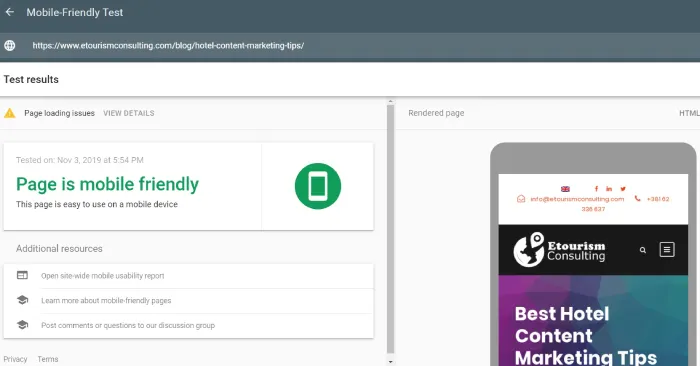
If you get the results as the ones in the picture above, you can relax because your website does not have any issues concerning this.
Otherwise, this test will make a list with all the things you should improve on your website to become Mobile Friendly. Sometimes it is just a little fix, but it many cases it is easier (and cheaper) to do a complete website redesign than trying to fix the old one.
You must not neglect the fact that your website is not adapted for mobile devices, unless you are ready to give up on potential tourists and guests who reach your website using their mobile devices, and their number goes even up to 90%.
We recently had a conversation with a client concerning the appearance of the website on mobile devices. We did have several objections, but he thought that it was not so important because his website had been visited mostly using a PC, at least he thought so.
He was shocked when we sent him this screenshot from Google Analytics.
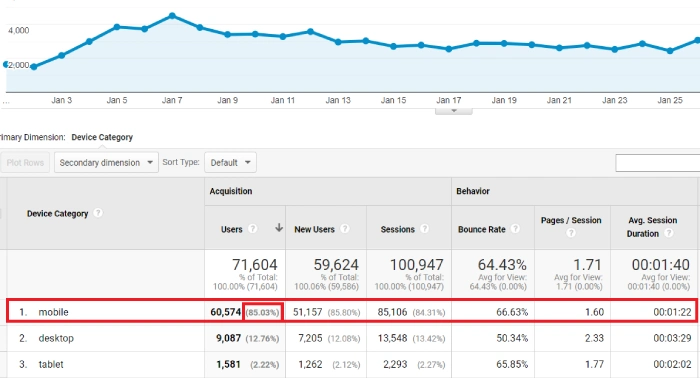
You can notice that mobile visits on this website were over 85%!
That is why it is important not only to pass the above mentioned test but also to visit the website by yourself (or ask someone else) using a mobile device and thoroughly check whether everything is looking nice, how the booking flow looks like, is anything hard to use or see…
If you went green on this test you should not be too relaxed, since having a mobile friendly website doesn’t mean that it has nice and smooth mobile user experience, optimized for bookings. However there is no an easy test for this, but if you want we can check your website and let you know what you need to fix and improve.
Obviously, in order to see all these data, you need to have Google Analytics installed on your website, which leads us to the following most common mistake on the website.
2. Google Analytics is not installed
Google Analytics is a must-have!
Google Analytics is a free service which automatically gathers, sorts, processes and puts at your disposal a vast variety of data on your website.
The fact that you will be closely acquainted with the profile of your potential tourists and guests who might visit your website and their behavior on the website can help you perceive the efficiency of your website as an information and sale channel.
If you want to know (you should) the age and gender of your website`s visitors, where they are coming from, which fields of interest and online search terminology bring them to your website, how much time they spend on your website and on which device, which web pages they usually visit, from which web pages they leave your website and what the reason is, whether they do certain actions on your website (filling in reservation inquiries, for instance), and many other things – all you need to do is make a Google Analytics account and connect it with your website by setting a Google Tracking Code.
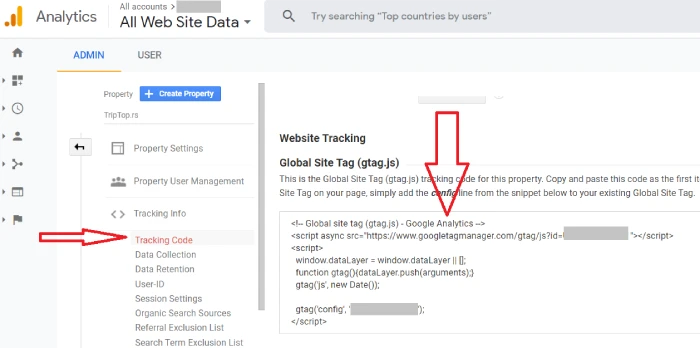
In the picture above you can see the way you can find the tracking code in the Admin section under the option Tracking info. You should insert this code in <head> section of your website.
Also important is the fact that Goolge Analytics can be connected with other tools and platforms, like Google Ads.
Needless to say, Goolge Analytics is necessary for the Internet marketing.
Your online marketing activities are irrelevant if you cannot measure them and track their performance.
3. Facebook Pixel Code Not Installed
Facebook Pixel allows us to measure and increase the efficiency of online marketing.
Without pixel you won’t be able to use advanced marketing techniques, such as remarketing and conversion tracking.
If you want to do a decent marketing for your travel business, having a Facebook Pixel set up is not a choice but a must-have.
Pixel represents a unique piece of code which is set on the website. If you have you can set up and track conversions and various events, optimize Facebook campaigns, create Custom and Lookalike audiences, run remarketing campaigns, etc.
This is how that piece of code looks like (installed using Google Tag Manager):
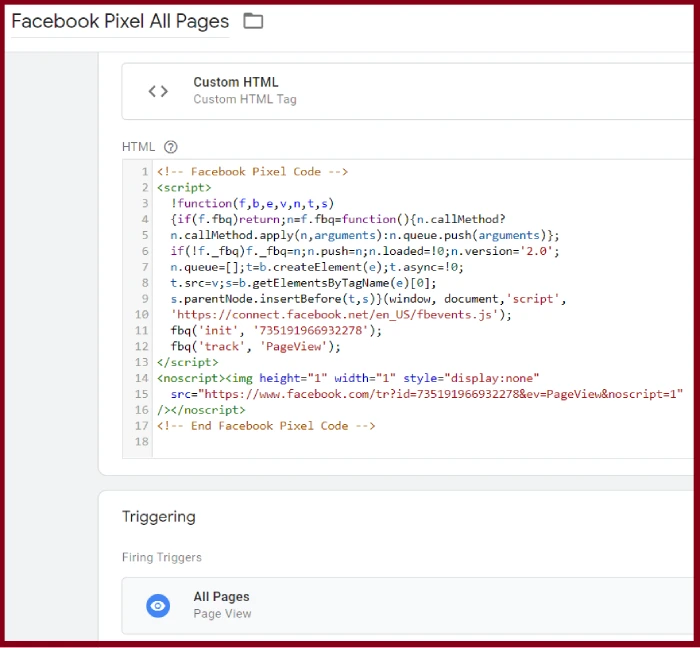
Pixel Code and the instructions for its installation on the website are located within Facebook Ads Manager, in the Pixel section.
4. Direct bookings are not possible or too complicated
This is the common issue on the websites that present hotels, hostels, villas, apartments and other accommodating objects.
We do not have to say how important the proper booking form is for these kind of websites.
People visiting your hotel can easily book their rooms using the booking forms by visiting your website. It’s a great way of getting direct bookings.
However, if you don’t have a booking form or is not working correctly or it is hard to use, the visitors will leave the hotel website and book the room using some of the OTAs websites (which comes with commissions) or, even worse, they will book at your competitor.
And you don’t want this to happen.
There are three most common issues with booking forms…
There is no booking form. Not even a phone number!
It seems unreal but there are still certain accommodation websites that have no option for online reservation.
The booking form either does not function or there is no booking form at all.
The phone number is usually tiny and hidden somewhere in the corner of the footer section; or there is no phone number at all.
It depends on the country but in most cases domestic travelers usually like to book by making a phone call.
So, pay attention to your inquiry forms, contact details and especially the phone number. That number must not remain tiny and hidden, it should look like this:
062 234 567 89
Beside its size, the number has to be clickable, meaning if you click the number, it should be dialed.
Booking process is too complicated
Having an online booking system is not enough; it has to be easy to use.
Potential guests who are currently on your website should be able to book their stay fast and easily, in a few simple steps.
Filling in the booking form should be intuitive and it should not ask for too much information from the users. It should contain only the fields which are necessary for further processing.
Booking form is not visible enough
The starting booking bar is usually located on the homepage, which is correct but not enough.
It is also necessary that it is located on every room page and to have a visible, attention garbing Book Now button across the whole website.
A nice example of an easily accessible and simple booking form is shown on the Pension Biba website.
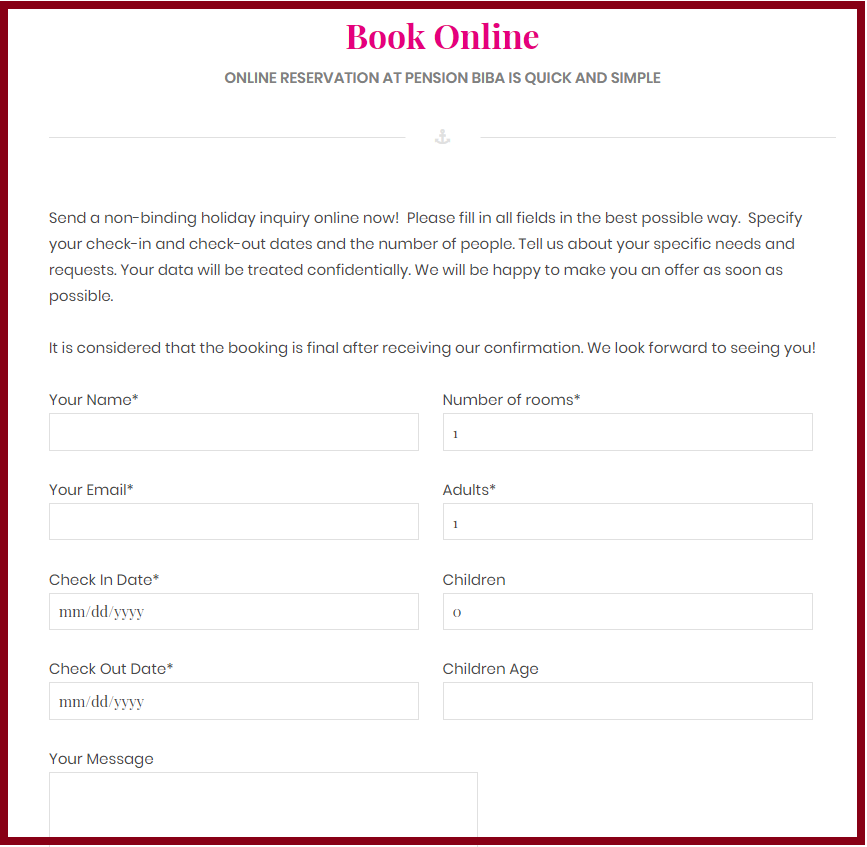
Lastly, we have to mention another problem which is common on hotel and apartment websites and has a negative impact on the completed bookings percentage, known as the conversion rate in the online marketing.
It is about the buttons and links which lead your potential guests from your website to the TripAdvisor or Facebook, Twitter, Instagram.
Not only is there a risk that potential guests will not come back to your website, but you literally send them directly to go-between agents, where they can also make a booking (that will cost you more), instead of leading them towards simple direct booking on your own website.
5. The website does not have an SSL certificate
SSL (Secure Sockets Layer) certificate represents the basic standard when we talk about the website security.
This is especially important if you sell something directly on a website, or you have various forms which need to be fulfilled with sensitive information, which is a common case with travel agency or hotel websites – reservation form, inquiry form, contact form…
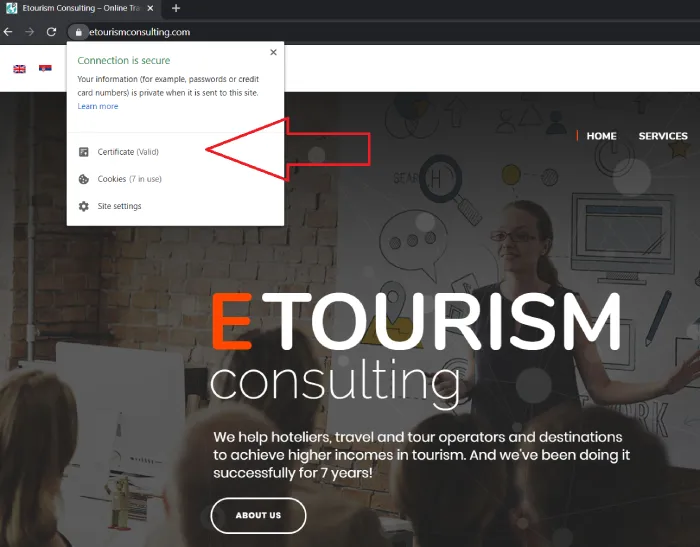
With the SSL installed, all the data are coded, encrypted, so that only a browser or server can decode them. In this way, the SSL helps you protect you and your guests from hackers, skimmers, or any kind of data confidentiality abuse.
This is especially important for travel websites where potential guests and tourists need to insert various sensitive information when filling the form, such as the address, ID and passport number, even credit cards.
Not only the visitors of your website will feel more secure, but your company will also look more professional.
By having the SSL you also confirm the authenticity of your webpage, verifying it as the only true representative of your hotel, travel agency, organization.
In other words, the visitors are aware that it is not a fake or suspicious website, but a credible company. People must believe you before they take their wallets from their pockets, right?
What is also important is the fact that the SSL certificate has become one of the most important SEO factors for website rankings in Google search results.
Google does not want to send visitors to those insecure websites so it gives the advantage in ranking to those which have the https:// mark.
Those websites which have the SSL certificate will get a “Connection is secure” mark from Google Chrome which increases the confidence in your website which is extremely important in the moments of making a booking decision.
Beside the above mentioned deficiency, there are a lot of less or more serious problems on travel websites which we have spotted during our analyses and they all together have a negative consequence concerning the functioning of the website as an information and sale channel, which is most often manifested in the following ways:
- Poor on-page and off-page SEO
- Poor customer experience
- Slow loading
Feel free to contact us and we can do a complete website audit for you, or even create a complete digital marketing strategy for your travel company.
Also, we can follow your improvement and support you with consulting services or we can do all the work instead of you, and you can dedicate your time to your business and tourists.
